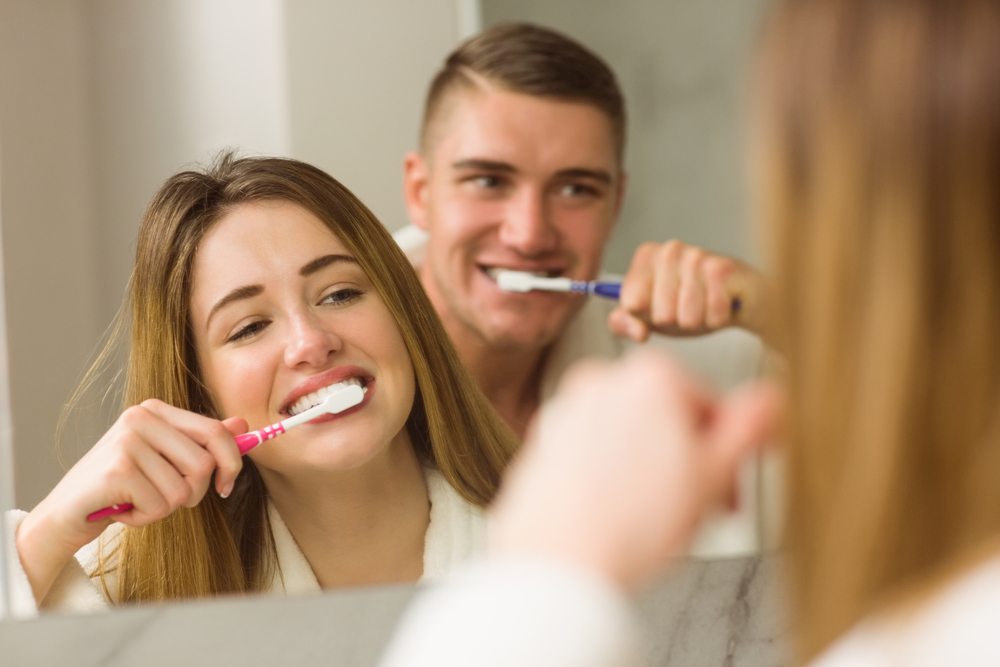Taking good care of your teeth and gums is important for your health and your smile. A comprehensive oral and dental care routine can protect you from cavities, gum disease, and bad breath. It also keeps your teeth healthy for life. We’ll show you the most important things you can do to maintain your oral health so you can have a beautiful smile for years to come.
Brushing your teeth is the first line of defense
One of the best things you can do for your oral health is to brush your teeth every day. If you don’t brush your teeth regularly, plaque and food particles that stick to your teeth can lead to tooth decay and gum disease. Dentists recommend brushing your teeth twice a day with a fluoride toothpaste. It’s important to brush your teeth and gums for two minutes. Make sure you brush all of your teeth.
Use a soft toothbrush and use gentle circular motions to protect your gums and teeth. Brushing too hard can cause your gums to pull away from your teeth or erode your enamel. Remember to replace your toothbrush every three to four months, or sooner if the bristles are worn.
Why Flossing is Important: Don’t Skip This Step
Brush your teeth to remove food and plaque from the outside of your teeth, but also use floss to get between your teeth and under the gum line where a toothbrush can’t reach. This reduces the chance of bacteria and gum disease.
Floss at least once a day, especially before bed, to remove food and plaque that has built up during the day. To avoid damaging your gums, slide the floss slowly between your teeth. If you have trouble flossing properly, you can also use a toothpick or water floss. They give just as good results.
Mouthwash is an essential and powerful product in everyday life. Mouthwash adds an extra layer of protection by killing bacteria, neutralizing acids, and creating fresher breath. Choose a fluoride mouthwash to help prevent tooth decay, or an antibacterial mouthwash to remove plaque and prevent gum disease.
To keep your mouth as clean as possible, use a mouthwash after brushing and flossing. However, don’t rinse your mouth with mouthwash right after brushing your teeth, as this removes the fluoride residue from the toothpaste.
Visit your dentist regularly: Prevention is key
Regular visits to the dentist are important for preventing major problems, even if you take good care of your teeth at home. Dentists recommend visiting your dentist at least twice a year for a cleaning and checkup. Your dentist will remove the tartar that regular brushing and flossing can’t remove. They’ll also look for early signs of cavities, gum disease, and other oral health issues.
Regular check-ups also give your dentist the chance to detect oral cancer at an early stage, which is especially important for people who smoke or drink alcohol.
Food and its effects on oral health
There is a direct link between diet and bone health. Getting enough nutrients through your diet will keep your teeth and gums healthy. Calcium and vitamin D are important for healthy bones and teeth. They can be found in foods such as fresh vegetables, dairy products, and grains with added vitamins and minerals.
On the other hand, you should avoid eating too much salt or sugary foods. Snacks and drinks that are high in sugar can feed the bacteria in your mouth, which can lead to plaque and tooth decay. Acidic fruits and drinks can erode tooth enamel over time. If you eat any of these foods, rinse your mouth with water and brush your teeth after 30 minutes.
Preventing dental injuries
If you play sports or do other activities that put you at risk for injury, wearing a mouth guard can help keep your teeth and gums healthy. To protect yourself during contact sports, you need a well-fitting mask. If you grind your teeth at night (bruxism), a mouthguard can protect your teeth from excessive wear from grinding.
Don’t smoke to keep your teeth healthy.
One of the leading causes of oral health problems is smoking. Smoking can lead to gum disease, tooth loss, bad breath, and oral cancer. Smoking makes it harder for your body to fight off infections and recover after dental surgery because it cuts off the blood supply to your gums. Quitting smoking will improve your oral health and make you healthier overall.
Oral health problems can be detected early.
It is important to pay close attention to your oral health and be alert to changes that could indicate a problem. If you have persistent bad breath, swollen gums, bleeding when brushing your teeth, or toothache, these could be signs of gum disease, cavities, or other dental problems. Getting treatment right away can help prevent the problem from getting worse in the future.
For example, gingivitis can be treated early with good oral hygiene and regular dental cleanings. If cavities are detected early, they can be filled; if more serious problems, such as oral cancer, are detected early, they can be treated more effectively.
Prioritizing your oral health will benefit you for the rest of your life. Making healthy lifestyle choices and brushing and cleaning your teeth and gums daily are all part of maintaining healthy teeth and a healthy mouth. The long-term health of your mouth can be improved by eating healthy, avoiding accidents, and quitting bad habits like smoking.
Following these tips will help keep your smile healthy and bright, and you won’t have to worry about serious oral health issues. Today is the day to start taking care of your teeth. A healthy smile will keep you feeling great for years to come.
